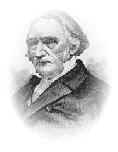|
|
![]()
John Broadus commented that Wayland "made a more potent impression upon the character, opinions, and usefulness of James Boyce than any other person with whom he came in contact".
R. Albert Mohler, Jr. (Founders Journal 19, Article 4)
 The son of a Baptist minister, Francis Wayland graduated from
Union College in 1813 and for the next two years continued his medical studies in his
native New York City. In 1816 he abandoned medicine to study for the ministry, but lack of
funds forced him to withdraw from the Andover Seminary. In 1817 he returned to Union
College and remained there as a tutor until 1821, when he became a minister at the First
Baptist Church in Boston. Wayland's sermons gained him notoriety in the Baptist community,
which in turn led to his receipt of an honorary degree from Brown in 1822 and his election
to the Corporation in 1825. Wayland returned to Union in 1826 as professor of mathematics
and natural philosophy, though his third stay there proved to be the shortest. That
December, he was elected Brown's president, and took office two months later. A beloved,
though stern, figure on campus, Wayland sought to squelch the unruliness that beset the
student body prior to Messer's resignation. He ordered that officers of the College visit
students' rooms and "occupy rooms in the College, during the hours appropriated for
study." Students alleged he "had a heavy foot for a student's door when it was
not promptly opened after his official knock."
The son of a Baptist minister, Francis Wayland graduated from
Union College in 1813 and for the next two years continued his medical studies in his
native New York City. In 1816 he abandoned medicine to study for the ministry, but lack of
funds forced him to withdraw from the Andover Seminary. In 1817 he returned to Union
College and remained there as a tutor until 1821, when he became a minister at the First
Baptist Church in Boston. Wayland's sermons gained him notoriety in the Baptist community,
which in turn led to his receipt of an honorary degree from Brown in 1822 and his election
to the Corporation in 1825. Wayland returned to Union in 1826 as professor of mathematics
and natural philosophy, though his third stay there proved to be the shortest. That
December, he was elected Brown's president, and took office two months later. A beloved,
though stern, figure on campus, Wayland sought to squelch the unruliness that beset the
student body prior to Messer's resignation. He ordered that officers of the College visit
students' rooms and "occupy rooms in the College, during the hours appropriated for
study." Students alleged he "had a heavy foot for a student's door when it was
not promptly opened after his official knock."
Wayland wrote several widely recognized textbooks on the topics of moral and intellectual
philosophy and political economy. He was also an advocate of changes in higher education.
In his own classes, he encouraged student analysis of the lesson and free discussion, both
of which were innovative for the time. Lack of support for his progressive views led to
his offer of resignation in 1849. Discussions with the Corporation resulted in the
withdrawal of his resignation.
His 1850 Report to the Corporation of Brown University on changes in the system of
collegiate education outlined Brown's first "new curriculum." Wayland
posited in the report that "every student might study what he chose, all that he
chose, and nothing but what he chose." This led to more flexible entrance and
degree requirements, which were later criticized, and to the introduction of electives.
After effecting remarkable change in the institution during his tenure, Wayland retired in
1855, and lived only blocks from campus until his death in 1865.
THE BURDENED GENTLY LED BY CHRIST
THE CLOUDS OF THE CHRISTIAN, THE CHARIOT OF GOD
|
The Reformed Reader Home Page
Copyright 1999, The Reformed Reader, All Rights Reserved |